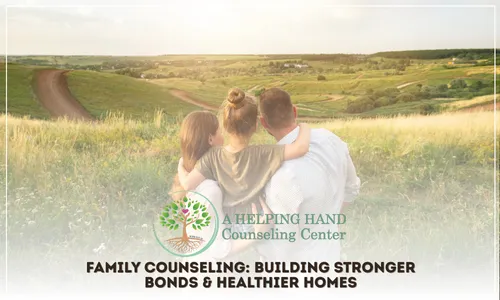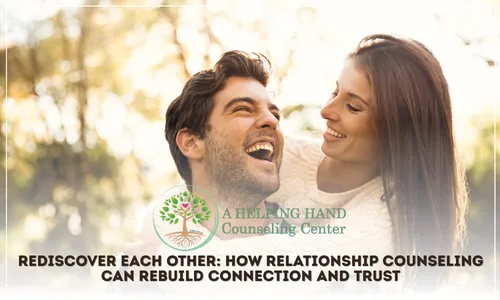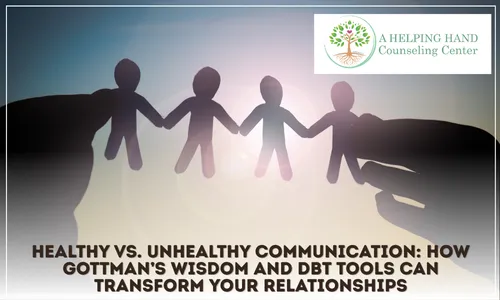
Healthy vs. Unhealthy Communication: How Gottman’s Wisdom and DBT Tools Can Transform Your Relationships
Communication is the heart of every relationship. Whether we’re speaking with a spouse, child, coworker, or friend, the way we communicate shapes how connected—or disconnected—we feel.
But not all communication is created equal. Certain styles build trust, intimacy, and mutual understanding. Others chip away at the relationship, causing stress, resentment, and emotional distance.
At A Helping Hand Counseling Center, we help clients every day learn how to improve communication patterns using practical frameworks like John Gottman’s Four Horsemen and tools from Dialectical Behavior Therapy (DBT). Together, these strategies offer a powerful roadmap to healthier interactions in every area of life.
In this post, we’ll explore how to identify and change unhealthy communication habits—and what healthy communication looks like in action.
Why Communication Patterns Matter
When we fall into unhealthy communication patterns, it can lead to:
- Increased conflict
- Emotional distance
- Erosion of trust and safety
- Increased anxiety and stress
- Poor relationship satisfaction
The good news? With awareness, skill-building, and practice, unhealthy patterns can be replaced with healthy, respectful, and effective communication.
Four Basic Communication Styles: Healthy vs. Unhealthy
Before diving into the Gottman and DBT tools, let’s start with four general communication styles you’ll often see in relationships:
Passive – Unhealthy – “It’s fine, I guess. Whatever you want.”
Aggressive – Unhealthy – “You’re so wrong, and I don’t care what you think.”
Passive-Aggressive – Unhealthy – “Sure, I’ll do it… just like last time when no one noticed.”
Assertive – Healthy – “I’d like to talk about what happened earlier. I felt unheard and would appreciate more communication next time.”
Assertive communication is the sweet spot: clear, respectful, and direct.
Gottman’s Four Horsemen: The Four Most Destructive Patterns
Renowned relationship researcher Dr. John Gottman identified four toxic communication behaviors that are highly predictive of relationship breakdown:
1. Criticism
Definition: Attacking your partner’s character rather than addressing a specific behavior.
Example: “You’re so selfish. You never think about how your actions affect me.”
Antidote: Gentle Start-Up
DBT Tie-In: DEAR MAN (Describe, Express, Assert, Reinforce, Mindful, Appear confident, Negotiate)
Healthy Example: “I felt hurt when you didn’t text me back. Can we talk about what happened?”
2. Contempt
Definition: Speaking with sarcasm, eye-rolling, mockery, or disdain. This is the most toxic of the Four Horsemen.
Example: “Oh, you forgot again? What a surprise. You’re hopeless.”
Antidote: Culture of Appreciation
DBT Tie-In: GIVE Skills (Be Gentle, act Interested, Validate, Easy manner)
Healthy Example: “I know you’ve been busy lately, and I appreciate how much you’ve been doing. I just miss spending time together.”
3. Defensiveness
Definition: Avoiding responsibility by making excuses or counterattacking.
Example: “It’s not my fault you’re always mad. Maybe if you weren’t so demanding…”
Antidote: Taking Responsibility
DBT Tie-In: FAST Skills (Fair, Apologies, Stick to values, Truthful)
Healthy Example: “You’re right, I should’ve mentioned I was going to be late. That wasn’t fair to you.”
4. Stonewalling
Definition: Withdrawing from interaction and shutting down emotionally.
Example: Giving the silent treatment or walking away mid-conversation.
Antidote: Self-Soothing
DBT Tie-In: STOP Skill (Stop, Take a step back, Observe, Proceed mindfully)
Healthy Example: “I’m feeling overwhelmed and need a few minutes to calm down. Can we take a short break and then keep talking?”
Bringing It Together: Real-Life Example
Scenario: Your partner forgot your anniversary.
Unhealthy Response (Criticism + Aggressive):
“I can’t believe you forgot. You clearly don’t care about me at all.”
Healthy Response (Gentle Start-Up + DEAR MAN + Assertive):
“I was really hurt when the day passed without acknowledgment. Our anniversary is important to me, and I’d like us to talk about how we can handle special dates in the future.”
Tips to Practice Healthy Communication Every Day
You don’t need to be perfect—but small changes add up. Try these simple shifts to improve your daily interactions:
Check Your Tone
- Even the right words can sound harsh if your tone is biting.
- Practice using a calm, respectful tone—especially during difficult conversations.
Pause Before Reacting
- Use the STOP skill to slow down and avoid knee-jerk reactions.
- Take a breath, observe your feelings, and proceed mindfully.
Use “I” Statements
- Express your feelings without blaming others.
- Example: “I feel (emotion) when (situation).”
Validate the Other Person
- Let them know their perspective matters.
- Even if you disagree, you can validate their emotions.
Repair Quickly
- If conflict happens (and it will), prioritize reconnection over being right.
- Apologize when needed and take responsibility for your part.
Why This Matters: The Mental Health Connection
Unhealthy communication doesn’t just impact relationships—it impacts your mental health. Constant criticism, defensiveness, or stonewalling creates:
- Increased anxiety
- Low self-esteem
- Emotional exhaustion
- Chronic relationship stress
At A Helping Hand Counseling Center, we help clients understand how their communication patterns affect their emotional well-being—and how to break out of unhealthy cycles.
Through services like:
- Individual Therapy for anxiety, self-esteem, and communication
- Couples Counseling for building healthy connection
- Family Counseling for improving communication across generations
- Telehealth Counseling for flexibility and convenience
…we provide practical tools like DBT skills, Gottman techniques, and personalized coaching so that clients can improve both their mental health and relationships.
Final Thought: The Way We Speak Is the Way We Love
At the end of the day, how we speak to others is how we love them.
If you’re ready to create healthier relationships—whether at home, at work, or in your community—start by practicing small, intentional shifts in your communication.
And if you’d like more support, we’re here to help.
Ready to Strengthen Your Communication Skills?
📞 Call A Helping Hand Counseling Center today at (407) 450-5985
📍 Or Request an Appointment Now
Our licensed therapists can help you build the skills to communicate with confidence, compassion, and clarity—so you can nurture the relationships that matter most.
A Helping Hand Counseling Center
- 303 Commerce Center Drive St. Cloud, FL 34769
- teamcare@ahhcounseling.com
- (407) 450-5985
- www.ahhcounseling.com
Subscribe to Our Newsletter
Posts Category
Most Popular Posts
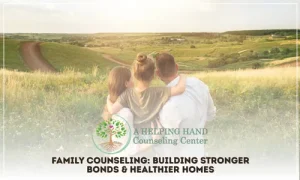
Family Counseling: Building Stronger Bonds & Healthier Homes
In a world where daily life can feel overwhelming, the importance of mental health counseling has never been more apparent. Whether you’re facing stress, anxiety,
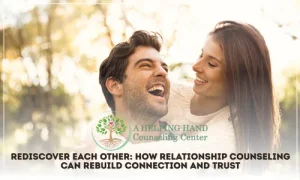
Rediscover Each Other: How Relationship Counseling Can Rebuild Connection and Trust
Struggling with disconnection, conflict, or emotional distance? Learn how relationship counseling can help couples rebuild trust, communicate better, and grow together. Every relationship tells a

Healing Together: How ART, Marriage & Family Counseling Transform Lives in St. Cloud
Discover how Accelerated Resolution Therapy and marriage & family counseling at A Helping Hand Counseling Center in St. Cloud, FL can help you heal trauma,
Subscribe to Our Newsletter


